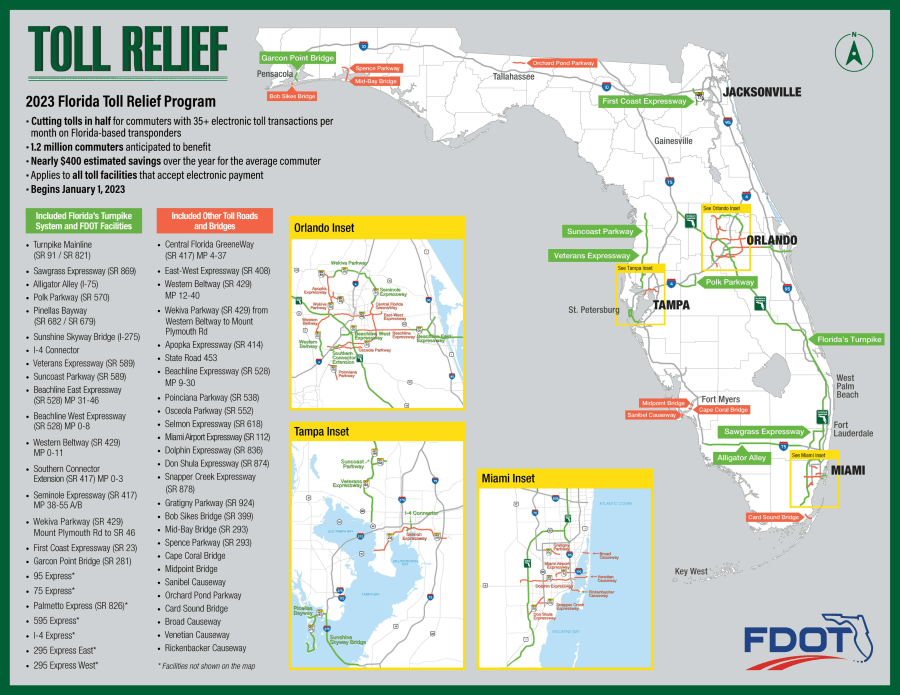FORT LAUDERDALE, Fla. (WFLA) — Gov. Ron DeSantis spoke in Fort Lauderdale at the Florida Department of Transportation District Four regional office. Signage at the event showed it would be focused on toll relief. DeSantis was in Fort Lauderdale to sign the toll relief bill passed during the December special legislative session.
The program follows up a proposal, and puts it into law, announced by the governor for the 2023 session.
The governor said it was one of several initiatives aimed at combating the effects of inflation and passing more tax relief items, saying that some things had to be done to function, such as driving to work.
“When you’re going to work in places, in many of our metro areas, like southern Florida, Orlando, some of those, you get hit with tolls,” DeSantis said. “As you’re going to and from work every day, so we said one of the things we can do to really make a difference for people, to alleviate the burden you’re seeing with inflation, is to do some major toll relief.”
DeSantis’ toll relief pitch in September was something he called “ambitious” and that it was an example of delivering on promises made while running for office.
“Not only did we make the proposal, we worked with Jared Perdue over at FDOT to kind of look at logistics, because basically what it is, any toll facility in Florida, you see the map, you see this here,” the governor said, holding a map. “As long as it can accept one of the SunPass or transponders, you charge it, and once you reach the threshold, I think it’s 35 charges, you get a rebate for 50% next month.”
DeSantis said the program was statewide and would affect every toll program, thanks to the legislative end of the proposal. He said it would help drivers who were sometimes spending more on tolls than their car loan, highlighting the $500 million for toll relief in 2023.
He also pointed out that tourists would not be able to benefit from the program, while those who lived in the state with the program would be able to save as much as $1,000, something “important while we have a lot of inflation.”
As far as the toll relief program being added to the special session on property insurance, DeSantis said with lawmakers already in Tallahassee, “why would we wait?”
Discussing the vote margins on the toll relief, DeSantis said the unanimous vote was good, but that following the most recent election, there “weren’t that many Democrats left” in the state capitol.
“You’ll start to see the credit appear in February, and then every month thereafter, all the way for the entire calendar year,” DeSantis said. “We’re excited about doing this, if you think about it, our state has been able to outpace the nation on issue after issue, particularly when it comes to the economy, particularly when it comes to running elections, education, you name it.”

He said he was happy that the state was “a lot of opportunity” and that Florida was run better than a lot of other states, saying that while Florida was a “fiefdom of freedom,” they had to deal with a lot of federal policies, pointing to inflationary spending by U.S. Congress and policies of other states that had “driven a lot of residents out” through “mismanagement.”
The governor promised more tax relief in the normal session in March 2023 with the legislature and that many of these initiatives were possible due to the record budget surplus in Florida.
DeSantis took questions after signing the toll relief bill into law. The first question was focused on the newly announced COVID-19 and vaccine accountability initiative to be led by Florida Surgeon General Dr. Joseph Ladapo.
The governor said that the Public Health Integrity Committee was made to push back on people “who have been wrong about almost everything along the way” regarding the COVID-19 pandemic, highlighting Florida laws that prevented people from losing their jobs over vaccination status.
He said those who had been kicked out of the U.S. military over not taking COVID-19 vaccines were just one example of issues the program would examine. DeSantis also said data on remdesivir, something he said Dr. Anthony Fauci had called a “standard of care” did not show benefits for Florida, and that the state was looking to deliver results on what had happened during the pandemic.
The next question DeSantis answered focused on the other legislation from the special session. He said the property insurance reform bill was made to fix problems seen in the market.
“Why do insurance companies leave our state, and they have no problem doing business in these other states? Well look, we have unique challenges, part of that’s true, but that’s not the main reason,” DeSantis said. “The main reason is that although Florida represents 8% of claims nationwide, but also represents more than 80% of litigation expenses nationwide.”
The governor said there are situations where a homeowner gets $20,000 in an insurance settlement, but their attorney got $400,000, another case he mentioned had an attorney get $1 million. DeSantis said Florida was one of the only states that “facilitates those types of lawsuits and showers a lot of attorneys fees.”
He described the bill as realigning Florida with other insurance markets that lack the “litigation problems” that Florida has. DeSantis said the bill would also help keep insurance and reinsurance companies in Florida still offering coverage.
The news conference follows the passage of all three bills passed in the December special legislative session of the Florida Legislature.
The bills passed in the special session focused on toll relief programs, hurricane relief, and reforming the property insurance market in Florida. The governor said he would be signing the other bills from the special session on Friday.






